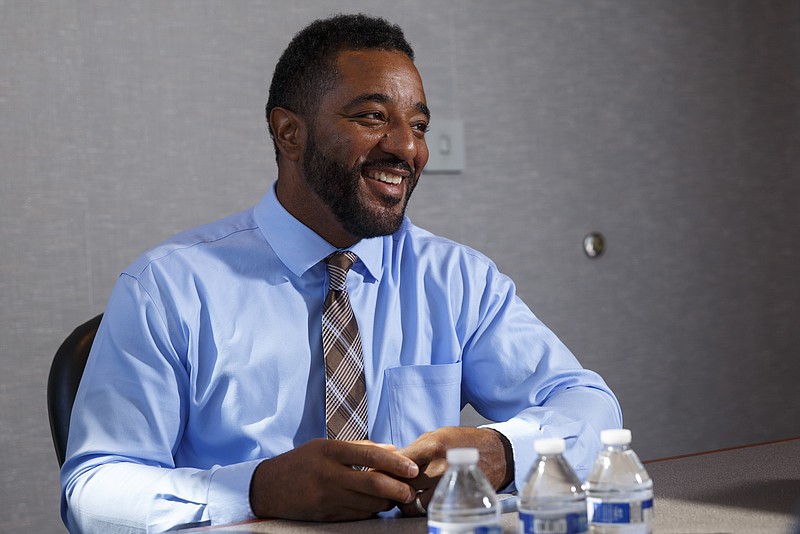Terminally tired from working the two jobs required of her to feed, clothe and shelter her two middle-school-aged children, Danielle Dixon nevertheless summoned the energy to visit McCallie School early Tuesday evening to listen to a program detailing the differences in raising boys and girls.
"The streets are trying to take all our kids," said the 34-year-old single mom. "I don't worry about my daughter. She's perfect - does well in school, stays out of trouble. But my son, now he's a good student, but he talks back too much. He's got a mouth on him. I worry about him. I tell him all the time, 'You're supposed to bury me one day. I'm not supposed to bury you.'"
Both go to Dalewood Middle, her 13-year-old daughter Mikalah Middlebrooks and 12-year-old son Cameron Dixon.
Because Cameron also plays defense for the Brainerd Bulls youth football league team - which sometimes practices at McCallie - the Bulls' parents were invited to hear Troy Kemp of the National Center for the Development of Boys and the United Way's Elizabeth Tallman discuss a number of troubling stats regarding the maturation process of young men in this country.
"We are trying to help people better understand boys," said Kemp, a longtime McCallie staff member and lacrosse coach who took over the NCDB when the school created it in 2015. "We're going to be doing a lot of these (programs) in the community in the months to come, and we're going to do them nationally as well."
Kemp grew up on Long Island, one of six childen - five of them boys - raised by a single mom. He met his biological father twice - once when he was 12 and another time when he turned 16.
"We were migrant farm workers," he said of those humble beginnings. "So a tomato looks different to me than most people."
He also said, "I've been married 25 years. That didn't happen in my neighborhood."
United Way's Tallman hinted her childhood was less than ideal also. She spoke of how ACES (Adverse Childhood Experiences) actually can alter the brain. She referred to a statistic that showed children who experience six or more ACES in their lives - everything from abuse to neglect to divorce - are expected to die 20 years before those who don't.

"The most damaging thing that can happen to a child's brain is neglect," she said.
Tallman then told of an experiment involving mice that were given an electrical shock each time they smelled cherry blossoms. The stunning part of the experiment was not the mice's eventual fear of cherry blossoms, it's that that fear was later found in the offspring of those mice and the offspring of the offspring, despite those second and third generations of mice having never experienced an electrical shock when smelling a cherry blossom.
The lesson, Tallman said, "Is how can we do better next time?"
But as Kemp pointedly pointed out, we've got to learn quickly to do better by our young people, especially our young men, during this time.
"We live in a time where there are fewer fathers in the home than ever before, especially African-American homes," said Kemp, who's black. "A boy's identity can only be confirmed by a man, and too many times there's no man around."
The statistics Kemp and Tallman displayed certainly hinted there need to be more father figures in our young men's lives, whether it's the dad, a coach, a teacher, a minister or just some caring guy with a big heart.
Merely consider the following: For every 100 girls suspended from public elementary school, 215 boys are. For every 100 girls ages 15-24 who commit suicide, 433 males of the same age commit suicide. The female brain is half developed at age 11 and fully developed by 22. With boys, the brain is half developed at 15 and fully developed at 30.
Perhaps that's why, according to Kemp, "the number one age group in prison is young men ages 18 to 24."
Those aren't the only troubling numbers Kemp discussed. Eighty-five percent of discipline problems in public schools are boys, as well as 67 percent of those making D's and F's and 55 percent of those dropping out.
To change these bleak numbers, both Kemp and Tallman suggested mixing a bit more love with discipline, whether it comes from a hard-working single mom or a two-parent home.
"My mother was a 'My way or the highway' person," Kemp said. "One of my brothers rebelled and got locked up. I don't blame my mother for that, but we know so much more now. When it comes to discipline now, I like to say, 'Less kung fu and more tai chi.'"
There are certainly numerous ways to raise children, even if the alarming scarcity of dads in too many homes and the gang violence in the streets make it seem more necessary than ever to embrace Kemp's assertion that "boys need an extended family of mentors."
Yet Kenneth Hammond - who has three sons ages 13 (Kenny), 12 (Braylon) and 7 (Bryson) - said Kemp's message hit home for him as a father.
"I may have been too much of a kung fu parent," he said after the presentation. "I might need to change a bit."
Something needs to change in the way we raise and protect all young people in this country. And quickly.
For as Danielle Dixon noted, "We've got too many kids who don't live to be 20. And that's not the right way to go."
Contact Mark Wiedmer at mwiedmer@timesfreepress.com.
